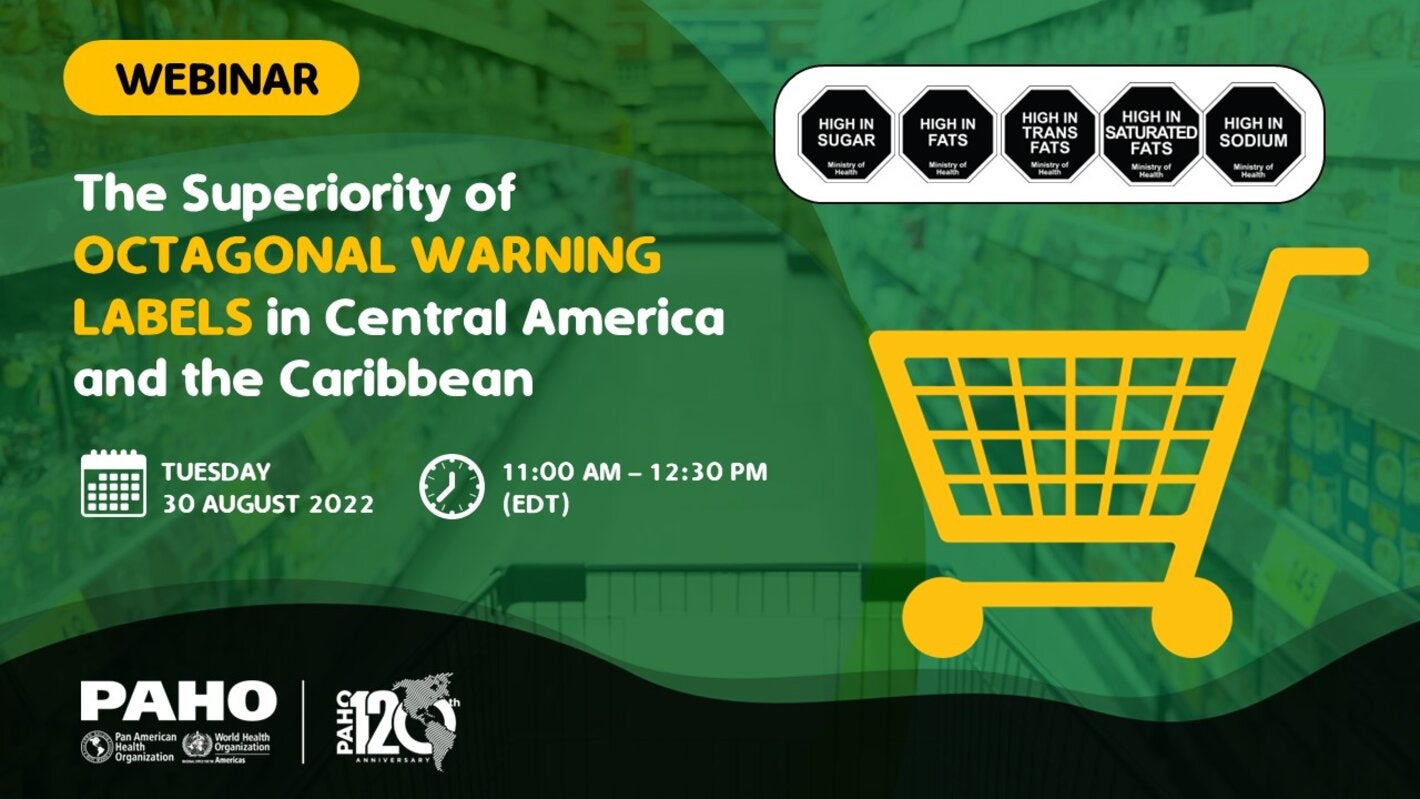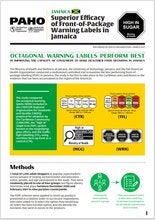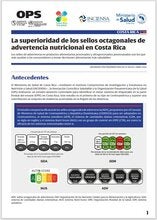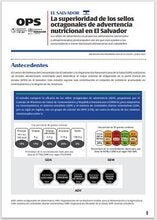
Join us on Tuesday, 30 August, 2022, to participate on the webinar "The Superiority of Octagonal Warning Labels in Central America and the Caribbean" hosted by the Pan American Health Organization, to present the results of the studies in Cental America and the Caribbean on the efficacy of the different labeling systems. The session will serve to discuss policy implications of the results obtained in these studies and disseminate the knowledge and build partnerships to exchange experiences on front-of-package labeling (FOPL) implementation.
Objectives:
- Present the results of the studies in Central America and the Caribbean on the efficacy of the different labeling systems.
- Discuss policy implications of the results obtained
- Disseminate the knowledge and build partnerships to exchange experiences on FOPL implementation
The intended audience of this webinar is:
- Ministries of Health officials and policy-makers responsible for designing and implementing food and nutrition policies from Latin America and the Caribbean
- Researchers and academia members
- PAHO personnel, country, and sub-regional officers from Latin America, the Caribbean and PAHO HQ
- Civil society organization representatives
- Public health advocates supporting regulatory policies to prevent obesity and diet-related NCDs, such as researchers, academia and practitioners
How to participate
- DATE: Tuesday, 30 August, 2022
- TIME: 11:00 am - 12:30 pm (EDT) [check below the local time in other cities]
- REGISTER: https://paho-org.zoom.us/webinar/register/WN_O1gOtRoZRMyr6udFiOiGEA
- After registration, you will receive a confirmation email with information on how to join the webinar.
- LANGUAGES: English and Spanish with simultaneous interpretation in both languages.
Recording
Agenda
- 11:00-11:10 am
- Welcome
- Dr. Fabio da Silva Gomes, Regional Advisor on Nutrition and Physical Activity, PAHO
- Opening remarks
- Leendert Nederveen, Unit Chief of the Non-Communicable Disease and Mental Health, PAHO
- Sistemas de etiquetado frontal como mejores practicas
- Dr. Tom Frieden, Resolve to Save Lives, President and CEO
- 11:10 am - 12:00 pm
- Multi-country study on the efficacy of labeling systems: methods and results
- Guatemala, methods and results
- Dra. Fernanda Kroker, Researcher in Population Nutrition, Institute of Nutrition of Central America and Panama (INCAP)
- Costa Rica, methods
- Karol Madriz, Researcher
- El Salvador, methods
- Danilo Pérez, Executive Director, Centro de Defensa del Consumidor
- Jamaica, methods
- Dr. Vanessa White-Barrow, Head- School of Allied Health and Wellness, University of Technology, Jamaica
- Panamá, methods
- Bethy Cruzado, President, Movimiento de Alimentación Saludable, Panamá
- Multi-country results
- Dr. Fabio da Silva Gomes, Regional Advisor on Nutrition and Physical Activity, PAHO
- 12:20-12:28 pm
- Policy agenda, implementations status, policy implications and support needed for adopting the octagonal FOPL in the country
- Panamá
- Honorable Diputada Yaidelis González, Legislator
- Nilka López, Ministry of Health
- 12:20 pm Q&A
- 12:28 pm Closing remarks
- Dr. Fabio da Silva Gomes, Regional Advisor on Nutrition and Physical Activity, PAHO
Background
Unhealthy eating is closely linked to the top three risk factors (high blood pressure, high fasting blood sugar levels, and over- weight/obesity) in the Americas, driven largely by excess intake of sugars, total fats, saturated fats, trans fats, and sodium ― which are referred to as the “critical nutrients” of public health concern.
The excess intake of these nutrients has been driven largely by the widespread availability, affordability, and promotion of processed and ultra-processed food products that are excessive in sugars, fats, and sodium. As such, an essential part of the solution requires the use of laws and regulations to reduce the demand for and offer of products that contain excessive amounts of critical nutrients. One of the key policy tools to regulate such products to prevent them from unbalancing diets is the use of front-of-package labeling (FOPL) to indicate to consumers which products contain excessive amounts of sugars, total fats, saturated fats, trans fats, and sodium.
FOPL systems can inform consumers about the excessive amounts of critical nutrients of public health concern in a direct, simple, easy, and quick manner.
The studies conducted in Costa Rica, Guatemala, El Salvador, Jamaica, and Panama, analyzed the effectiveness of the octagonal warning stamps (ADV), to be adopted in Central America and the Caribbean, and other systems like the traffic light system (SEM), the guideline daily quantity system (GDA, for its acronym in English) and the Nutri-Score system (NUS).
The results of the studies support the conclusion that the frontal labeling system of octagonal warnings, included in the proposals of Central American and Caribbean legislation, is the most effective and constitutes the best option for the population. In addition, they guide decision-making in public policies aimed at establishing healthier food environments and preventing non-communicable diseases related to poor nutrition.
Related links
- Superior Efficacy of Front-of-Package Warning Labels in Jamaica
- La superioridad de los sellos octagonales de advertencia nutricional en Costa Rica
- La superioridad de los sellos octagonales de advertencia nutricional en El Salvador
- Front-of-Package Labeling as a Policy Tool for the Prevention of Noncommunicable Diseases in the Americas
- Front-of-package labeling (PAHO topic page)
Time in other cities
- 8:00 am.– Los Angeles
- 9:00 am. – Belmopan, Guatemala City, Managua, San Jose (CR), San Salvador, Tegucigalpa
- 10:00 am. – Bogota, Mexico City, Panama City, Kingston, Lima, Quito
- 11:00 am. – Asunción, Bridgetown, Caracas, Castries, Georgetown, Havana, La Paz, Nassau, Ottawa, Port-au-Prince, Port of Spain, San Juan, Santiago, Santo Domingo, Washington DC
- 12:00 pm - Buenos Aires, Brasilia, Montevideo, Paramaribo
- 5:00 pm. – Geneva, Madrid
For other cities, check the time in the following link
Documents




